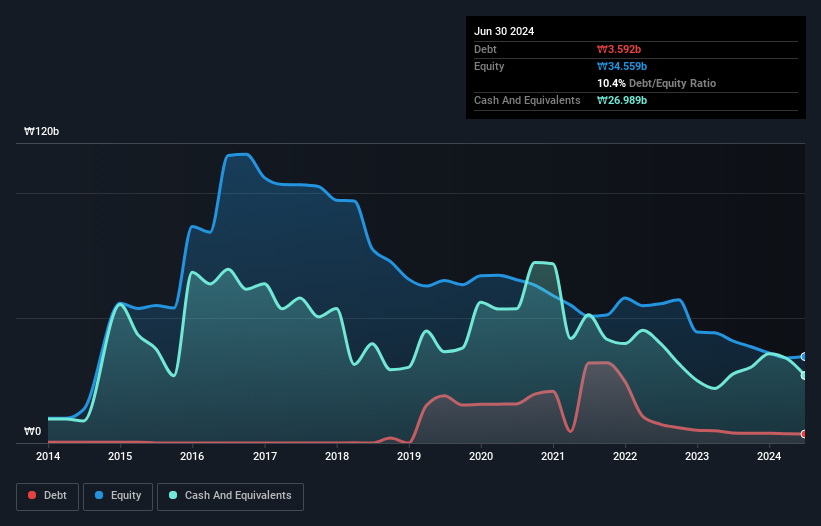- South Korea
- /
- Entertainment
- /
- KOSDAQ:A173940
Does FNC ENTERTAINMENT (KOSDAQ:173940) Have A Healthy Balance Sheet?
The external fund manager backed by Berkshire Hathaway's Charlie Munger, Li Lu, makes no bones about it when he says 'The biggest investment risk is not the volatility of prices, but whether you will suffer a permanent loss of capital.' When we think about how risky a company is, we always like to look at its use of debt, since debt overload can lead to ruin. We note that FNC ENTERTAINMENT Co., Ltd. (KOSDAQ:173940) does have debt on its balance sheet. But is this debt a concern to shareholders?
Why Does Debt Bring Risk?
Debt and other liabilities become risky for a business when it cannot easily fulfill those obligations, either with free cash flow or by raising capital at an attractive price. If things get really bad, the lenders can take control of the business. However, a more usual (but still expensive) situation is where a company must dilute shareholders at a cheap share price simply to get debt under control. Of course, the upside of debt is that it often represents cheap capital, especially when it replaces dilution in a company with the ability to reinvest at high rates of return. The first step when considering a company's debt levels is to consider its cash and debt together.
See our latest analysis for FNC ENTERTAINMENT
How Much Debt Does FNC ENTERTAINMENT Carry?
The image below, which you can click on for greater detail, shows that FNC ENTERTAINMENT had debt of ₩3.59b at the end of June 2024, a reduction from ₩4.04b over a year. However, it does have ₩27.0b in cash offsetting this, leading to net cash of ₩23.4b.

How Strong Is FNC ENTERTAINMENT's Balance Sheet?
The latest balance sheet data shows that FNC ENTERTAINMENT had liabilities of ₩29.6b due within a year, and liabilities of ₩40.5b falling due after that. On the other hand, it had cash of ₩27.0b and ₩7.63b worth of receivables due within a year. So its liabilities total ₩35.5b more than the combination of its cash and short-term receivables.
This is a mountain of leverage relative to its market capitalization of ₩55.3b. This suggests shareholders would be heavily diluted if the company needed to shore up its balance sheet in a hurry. While it does have liabilities worth noting, FNC ENTERTAINMENT also has more cash than debt, so we're pretty confident it can manage its debt safely. The balance sheet is clearly the area to focus on when you are analysing debt. But it is FNC ENTERTAINMENT's earnings that will influence how the balance sheet holds up in the future. So when considering debt, it's definitely worth looking at the earnings trend. Click here for an interactive snapshot.
In the last year FNC ENTERTAINMENT wasn't profitable at an EBIT level, but managed to grow its revenue by 27%, to ₩91b. Shareholders probably have their fingers crossed that it can grow its way to profits.
So How Risky Is FNC ENTERTAINMENT?
While FNC ENTERTAINMENT lost money on an earnings before interest and tax (EBIT) level, it actually generated positive free cash flow ₩268m. So although it is loss-making, it doesn't seem to have too much near-term balance sheet risk, keeping in mind the net cash. One positive is that FNC ENTERTAINMENT is growing revenue apace, which makes it easier to sell a growth story and raise capital if need be. But that doesn't change our opinion that the stock is risky. There's no doubt that we learn most about debt from the balance sheet. However, not all investment risk resides within the balance sheet - far from it. Be aware that FNC ENTERTAINMENT is showing 2 warning signs in our investment analysis , and 1 of those is concerning...
If you're interested in investing in businesses that can grow profits without the burden of debt, then check out this free list of growing businesses that have net cash on the balance sheet.
New: AI Stock Screener & Alerts
Our new AI Stock Screener scans the market every day to uncover opportunities.
• Dividend Powerhouses (3%+ Yield)
• Undervalued Small Caps with Insider Buying
• High growth Tech and AI Companies
Or build your own from over 50 metrics.
Have feedback on this article? Concerned about the content? Get in touch with us directly. Alternatively, email editorial-team (at) simplywallst.com.
This article by Simply Wall St is general in nature. We provide commentary based on historical data and analyst forecasts only using an unbiased methodology and our articles are not intended to be financial advice. It does not constitute a recommendation to buy or sell any stock, and does not take account of your objectives, or your financial situation. We aim to bring you long-term focused analysis driven by fundamental data. Note that our analysis may not factor in the latest price-sensitive company announcements or qualitative material. Simply Wall St has no position in any stocks mentioned.
About KOSDAQ:A173940
Adequate balance sheet and slightly overvalued.
Market Insights
Community Narratives




